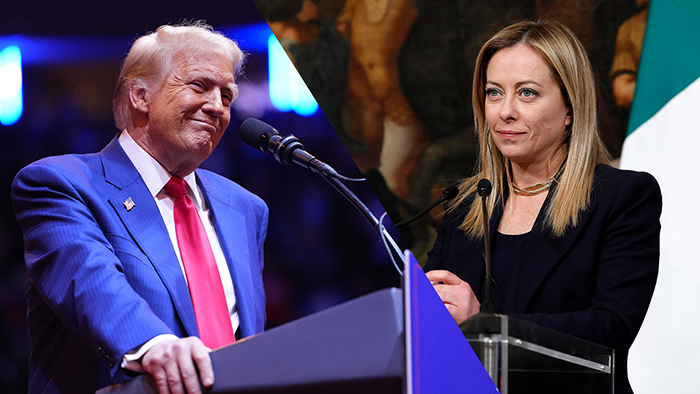Analyses / Europe, European Union, NATO
18 November 2024
Donald Trump’s Victory: Changes Ahead Between Italy and the United States?

The return of the “Tycoon” could have significant impacts for European countries. Giorgia Meloni has partly anticipated the issue with a strategy of rapprochement with Donald Trump, but this tactic could also have repercussions both at the national and international levels.
Giorgia Meloni’s ambiguity, a winning bet
On March 1, 2024, Giorgia Meloni met with Joe Biden at the White House and confirmed Italy’s Atlanticist policy. The relations were stable and solidified, symbolized by the photo of President Biden affectionately kissing the head of the Prime Minister. This gesture was meant to reassure Western partners who were increasingly seeing Meloni align with European sovereigntists, but also with Republicans and Elon Musk, the guest of honor at the Fratelli d’Italia party celebration a few months earlier in December 2023.
Giorgia Meloni thus played both sides: constantly in touch with Joe Biden on diplomatic matters, while also building ties with Republicans through Elon Musk, without ever making the mistake of appearing directly with Donald Trump to avoid upsetting the Biden administration. This format satisfied Italians: supporters of Giorgia Meloni appreciated her close relationship with the SpaceX founder, while opponents of the Italian government noted the consistency of its international policy and pre-established Western alliances, directly following Mario Draghi’s approach.
Donald Trump’s victory changed the perception of U.S. politics for the Italian government, which naturally shifted its focus toward the Republicans. While Giorgia Meloni avoids overly direct statements, some members of her government show clear enthusiasm for Trump’s election. Matteo Salvini, the Deputy Prime Minister, declared that he would wear a red tie for the next four years in homage to Donald Trump. The government has now taken a much clearer position, which could play in Italy’s favor during upcoming trade negotiations with the United States.
A way to anticipate potential trade difficulties?
Donald Trump has announced that he plans to drastically increase taxes on imports. This is very bad news for Italy, which is the leading European exporter to America for small and medium-sized businesses. Lombardy, the economic engine of Italy, is one of the major players in these exports to the United States in the manufacturing sector. The strategy of aligning with the Republicans and the future 47th president could therefore be explained by the need to limit potential conflicts that could have a significant economic impact on the Italian economy.
It remains to be seen if Donald Trump truly intends to increase all customs duties on Italian products. Transalpine exports to America are based on the sale of high-tech industrial equipment that enables production increases: taxing products that help Americans grow their output doesn’t seem very logical, but nothing is impossible. Another sector that could be affected is the less strategic one for the United States: agri-food. During his first term, Donald Trump decided to tax the number one wine importer to his country, France. This was an opportunity for Italy, which became the leader in wine sales across the Atlantic. If the new president decided to apply the same policy in his next term, Italy would be penalized in this sector. For the central and southern regions of Italy, which are less industrialized, an increase in customs duties would be very bad news.
The rapprochement with the future American government is not only useful for exports, but also for development agreements in Italy. Elon Musk, a declared admirer of Giorgia Meloni, has spoken of a potential investment on the peninsula: he is considering building a new technological center in Emilia-Romagna, a region already at the forefront of research. The installation of a branch of SpaceX would be an important opportunity for Italy, and the privileged relationship between Giorgia Meloni and Elon Musk could play in favor of the Bel Paese.
The great divide between the old and the new continent.
Italy’s dual role, capable of collaborating with both Washington and Brussels, currently seems to be a major asset, as long as Giorgia Meloni manages to avoid making difficult choices that would force her to upset one of the two capitals. The current Italian Minister for European Affairs, Raffaele Fitto, is a candidate for the position of European Commissioner. His appointment would be an important symbol of mutual support between Italy and the European Union, but he will also need to prove himself: during his first hearing for the commissioner position, he had to present a pro-European face to convince partners to vote for him, but an agreement still seems far off. What is certain is that the sovereigntist rhetoric of Fratelli d’Italia and its connections with the Republicans do not work in his favor. Giorgia Meloni may need to make more pro-European decisions in order to stay in line with the past two years and reassure neighboring partners, at the risk of disappointing Italy’s right-wing electorate.
Relations remain positive with the European Union, and ties with the Republicans are strong, thanks to Elon Musk, but Musk could also become a burdensome ally for Meloni’s government.
The Tesla owner has clearly taken a position on his social media platform X against the Italian judges dealing with the status of migrants arriving in southern Italy. This interference in Italian politics was not appreciated by President Sergio Mattarella. Giorgia Meloni did not react, caught between two fires. This silence could benefit Matteo Salvini, who is seeking a new push to return to the center of Italian politics and is increasingly adopting an opposition stance within the majority.
Agreements that are difficult to amend should remain as they are.
From a military perspective, Italy and the United States will need to continue their collaboration: two U.S. bases are located on the peninsula, including the Sigonella base in Sicily, from which various military operations are launched in the Mediterranean. The alignment of Italian policy with U.S. policy on the Israeli-Palestinian conflict facilitates this collaboration, but the American bases, just like the support for Benjamin Netanyahu’s government, are not popular with all Italians. Giorgia Meloni will need to find a way to satisfy her electorate and her partners, with the risk of disappointing them all.
The Italian government must manage its relations with both the United States and the European Union, as well as with China, one of the most important global players. Rome is still a signatory of an agreement with Beijing for the implementation of the new Silk Road, an agreement that is not appreciated by Washington. While Giorgia Meloni has been much more cautious regarding this agreement, which she is questioning, it won’t be so easy to back out. Chinese investments in Italy are significant, and the port of Trieste is, for now, one of the central points for constructing the Belt and Road Initiative due to its strategic location: this port is the northernmost in the Mediterranean and provides almost direct access to the Central European market. Given these conditions, it will not be easy for the Italian government to reverse course, as the economic stakes are high, but it is hard to imagine that the Trump administration would view this Sino-Italian alliance favorably.
Giorgia Meloni will inevitably have to play her cards very skillfully if she wants to remain a partner to all global actors, while keeping an eye on her electorate and her allies in the government majority.

